How English empowers your work and career
About 20% of people worldwide speak English at work, whether it’s their first, second, or foreign language. This means that English is really important in business life. This new study mentions how English is used at work today. It looks at how good English skills can help you get better jobs in 2024, how companies give language training to their workers, and how confident people feel using English at work (1) (2).
English is unquestionably the language of the international business community
Learning languages is good for companies because it helps them communicate better, work together better, and makes their workplace more enjoyable. In the future, knowing English will be very important for keeping jobs, especially with new technologies and AI.
Research overview
This study was done using an online survey by PSB Insights in five different countries: Japan, Italy, Saudi Arabia, Brazil, and the US (Florida). They did the survey from October 4th to October 26th, 2023, and there were 1000 people who answered in each country. All the people who took part in the survey spoke English as a second or foreign language and were from many different jobs, levels in their career, and ages. They made sure to have an equal number of men and women taking part.
English is the language of the workplace and will become increasingly important over the next five years
Several studies have shown how important English is in a global economy, and they predict it will stay the main language of business in the future (3). We have heard what managers and HR recruiters think, but what about the employees themselves? In all the countries studied, 85% of the people said English is important for their jobs now and will be for a while. 88% of workers believe it will be even more important in the next five years, showing how crucial it is for doing well at work. Although people from different generations mostly agreed on how important English is now, more younger people (Gen Z and Millennials) think it will become even more important in the future (92% compared to 73% of Boomers). This shows that there might be more jobs where English is needed and that younger generations see it as more important than older ones do.
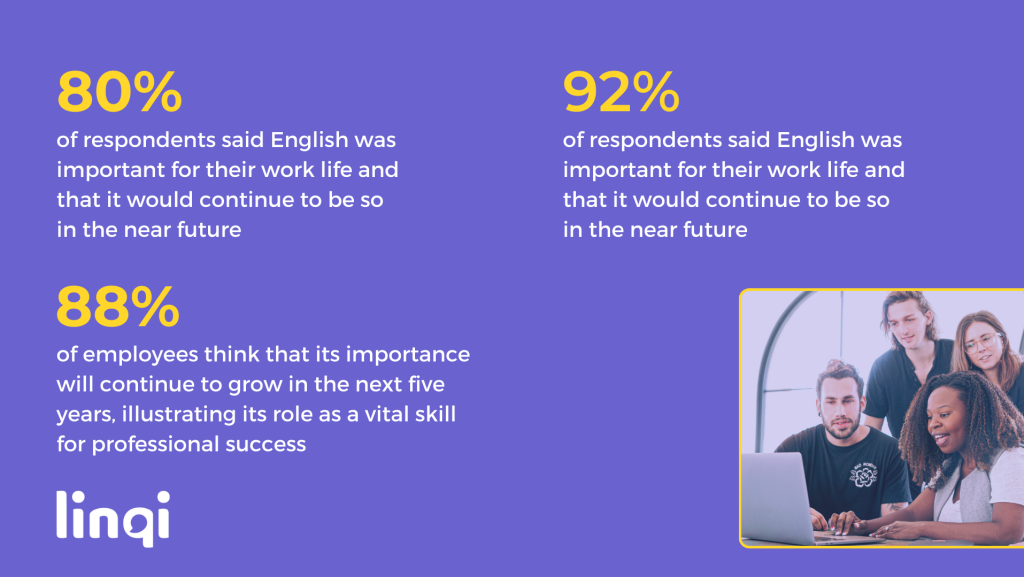
Gen Z and Millennials Predict Increasing Importance of English for Work
The research found that workers of all levels see getting better at English as a way to open up more job options. This supports a trend we are seeing where English is needed for all kinds of jobs, not just higher ones. Younger generations, who are going to be in the workforce the longest, believe English proficiency is only going to become more important for work (4).
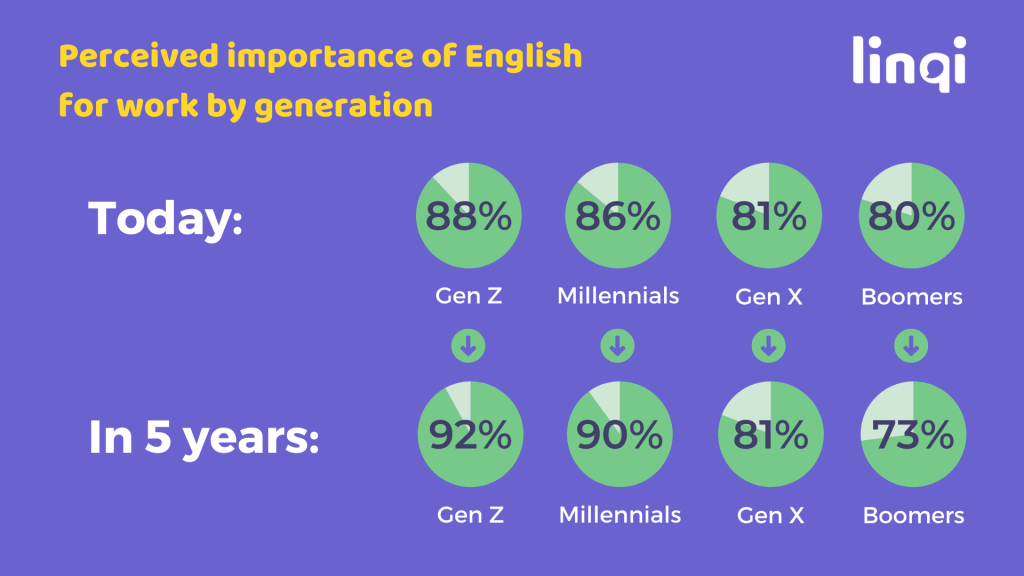
Around 80% of people we asked worldwide think that being good at English can affect how much money they can make. 51% of people mentioned they were studying English to have more job options, especially ones with higher salaries. In the US and Brazil, more than half of people are learning English because they want jobs that pay more.
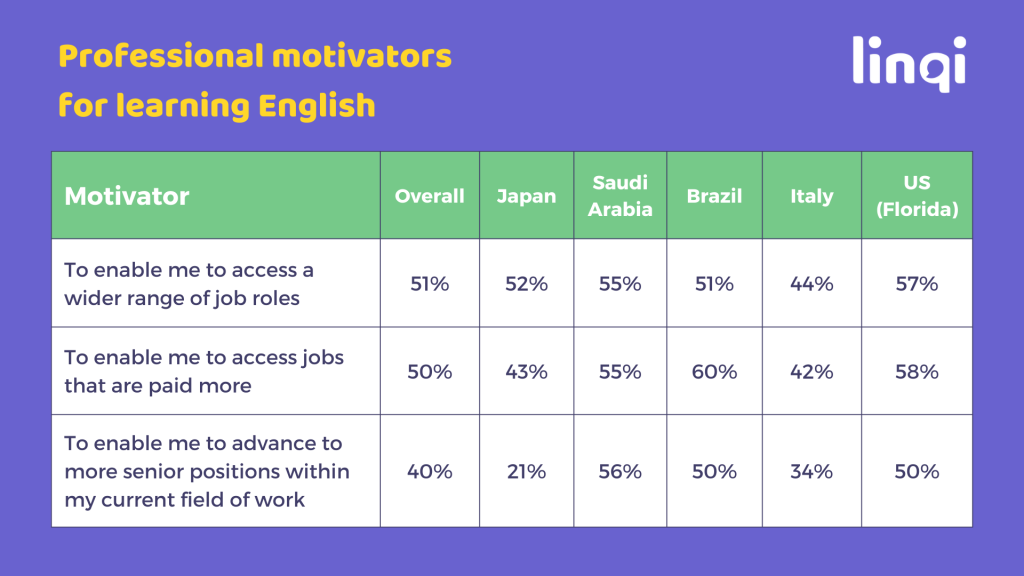
We also discovered that people who are better at English are more likely to have higher-up jobs. For example, 32% of those with limited English proficiency are in a management role vs 76% of those with advanced English skills.
Given the uncertain political and economic situation, it is not surprising that many of the people we surveyed, especially younger ones, are worried about money (5). Our research shows that lots of them are trying to improve their English skills to get better-paying jobs and feel more financially stable. Around 8 out of 10 people worldwide think that being good at English can help you earn more money, and this goes up to more than 9 out of 10 in Saudi Arabia and the US. More than half (56%) of all respondents think that people who speak English well can earn up to 50% more, and one out of five think it could even be over 80% more.
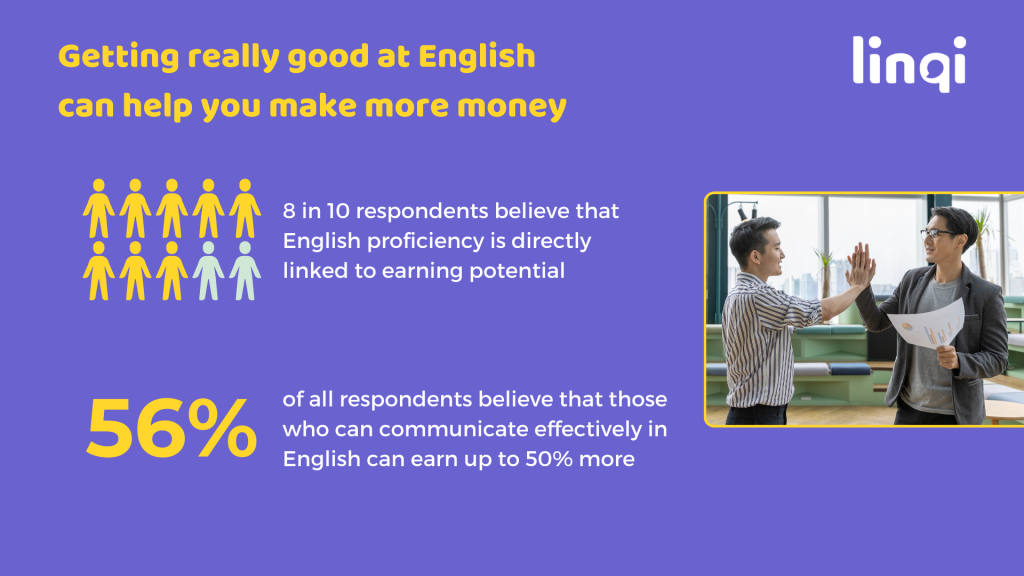
People who are better at English are happier with their salary compared to those who aren’t as good at English. Three out of four people with good English are happy with what they earn, while less than half of those with limited English feel the same way. Around 42% of people who are good at English make a lot of money, while only 11% of those who aren’t good at English do.
Employers are worried about keeping their staff happy and making sure they stay. A study by Gallup found that only 23% of workers worldwide feel really involved in their jobs, while 6 out of 10 are slowly losing interest. This costs the global economy a lot of money, around $8.8 trillion every year (6). So, how happy are the people we asked with their jobs?
In general, 77% of them said they were pretty happy with their job. But when we looked closer at the results, we saw a big difference in how satisfied people were depending on how good they were at English. People who were best at English were 24 points happier with their job than those who were worst at it.
Many people in the workforce care a lot about learning new things, especially younger ones (Gen Z and Millennials). A huge 94% of workers say they would stick with their job longer if their managers helped them learn and grow (7). But, with the economy not being very stable, lots of companies are cutting back on training and helping their employees grow. As businesses try to decide what’s most important to spend money on, language training often gets cut first (8). Some managers think learning a language is more about personal growth than work, so they don’t see how it helps their company. Our research shows that only one in three companies is giving their employees extra language training right now.
Employees are least confident in speaking and writing
When people were asked how confident they felt using English at work, only a quarter of them said they felt sure about all four skills (listening, reading, speaking, writing). For those who aren’t very good at English, this number drops to only 3%. People generally feel more confident about reading and listening in English than speaking or writing. More than half of the people we asked said they weren’t confident about speaking or writing in English, and this goes up to over 60% for those who aren’t very good at English.
Only 25% say they feel confident in all four skills
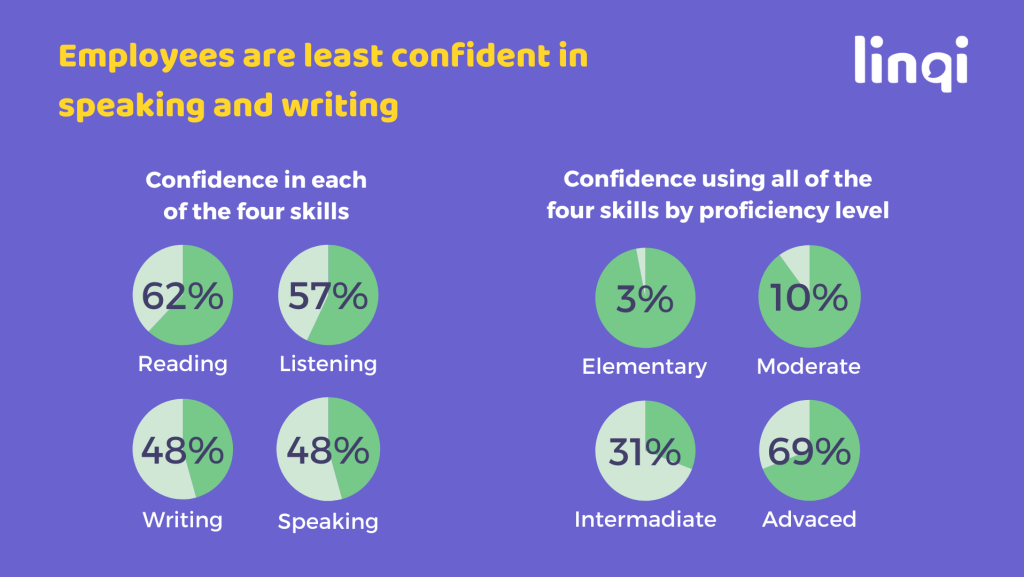
Poor English language skills impact self-confidence at work
When you are working in English and it’s not your first language, it can be really frustrating. Simple work tasks get harder, and talking to collegues and customers becomes more difficult. In our survey, 72% of people said their job would be easier if their English was better. Also, only 10% of workers who aren’t very good at English felt like they could say everything they wanted to at work, while almost double that, 19%, said they felt dumb because of their English.
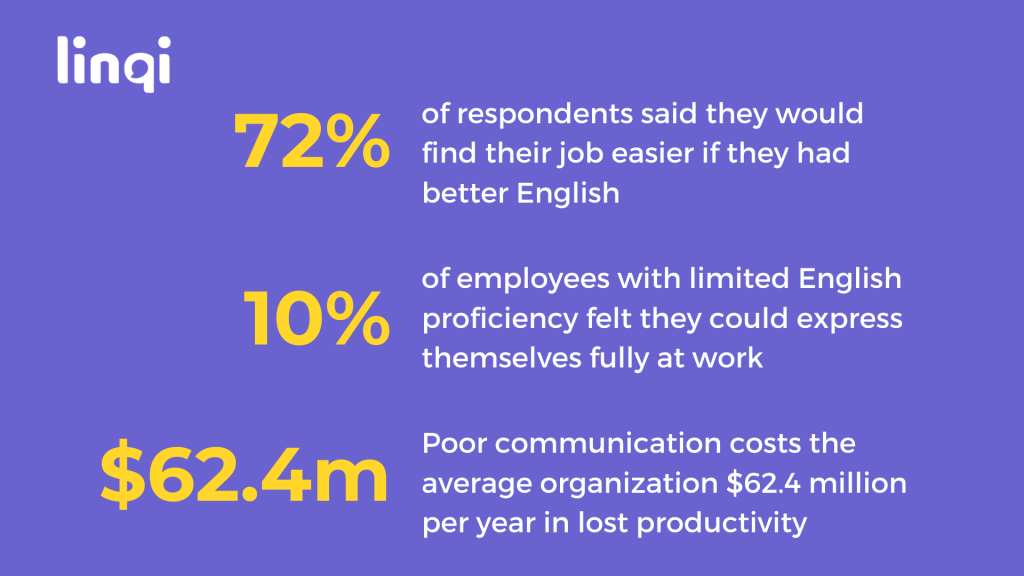
Not being very good at English doesn’t just affect how you feel about yourself, it also means you can’t show what you are really good at. People might avoid doing things like talking in meetings or writing reports because it takes too much effort. Bad communication makes companies lose about $62.4 million every year because people can’t work as well together (9). If companies help their employees get better at English, they can make them work better and use their skills more effectively.
Better English skills make your career more AI-proof
There has been a lot of talk lately about how generative AI will affect people’s jobs, especially the kinds of jobs that might disappear because of this new technology. According to new research by Pearson, AI will mostly affect office jobs in the next 10 years, but it’s not all bad news (10). Actually, it could be good news if both employers and employees get ready for the skills that will be important in the future workplace. These skills include knowing how to use technology and also skills that only humans have, like being able to talk and work well with others.
How then did our participants feel about AI and its impact on job security? Almost 40% of survey respondents believe their job is likely to be replaced by AI within the next 5 years – rising to 56% in Saudi Arabia. Younger generations (Gen Z and Millennials) are more concerned (43%) about losing their jobs to AI than Gen X (32%) and Boomers (21%).
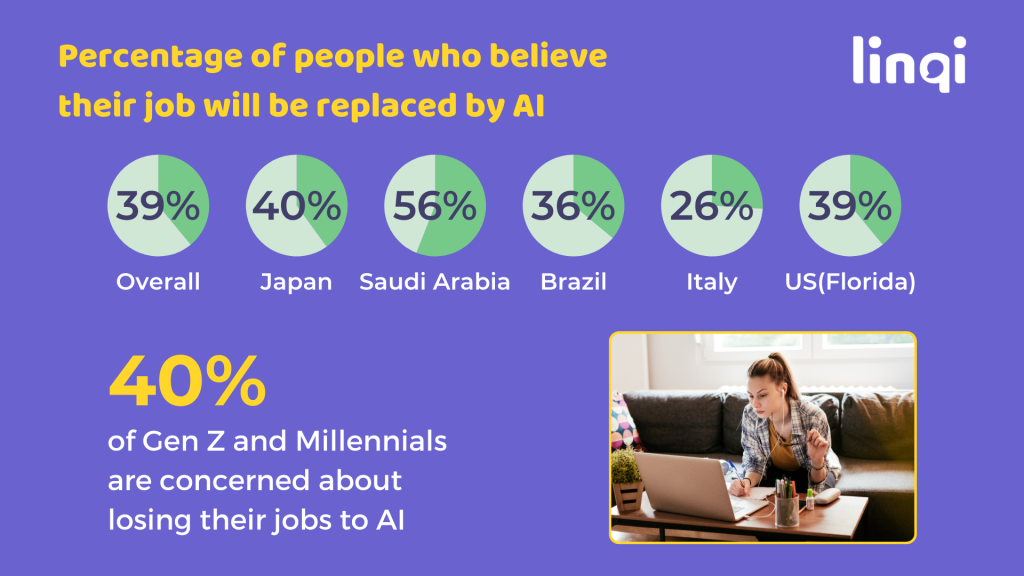
Even if jobs don’t completely go away, some tasks will be done by AI, so it makes sense for employees to focus on learning new skills. Since English is the main language used in business and will be for a while, how do workers feel about needing to get better at English to make sure they keep their jobs?
More than 40% of them say they are learning English to help deal with the changes AI and technology might bring to their jobs. They want to keep up with technology or improve their skills so they can still compete for jobs.
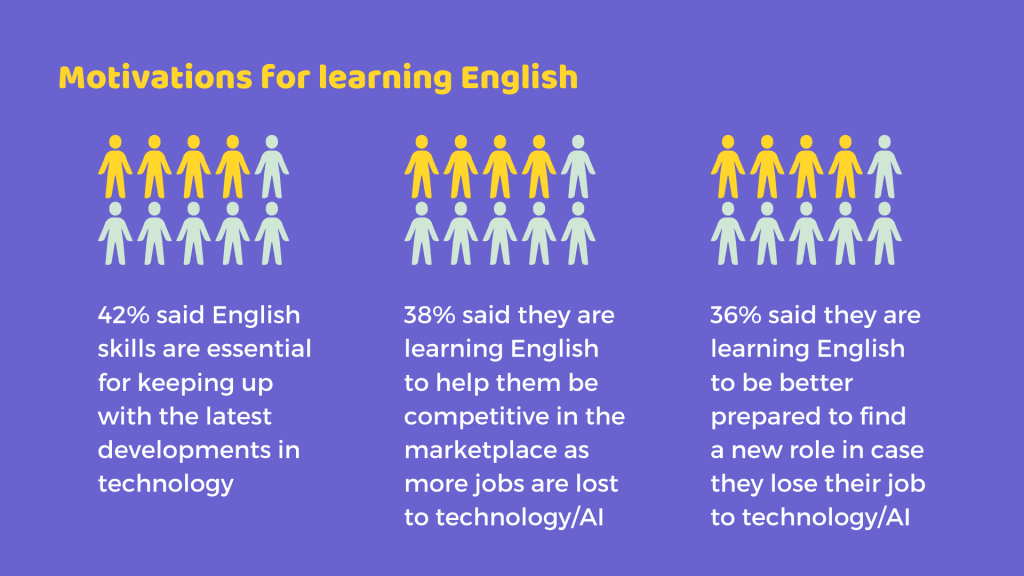
Good communication with customers, collegues, managers, and suppliers is really important for a business to grow. Studies found that communicating with others is the hardest part for employees, and it’s where they feel least confident of themselves. But most employers aren’t helping their employees with English language skills, even though it is something they want and think is important.
We understand that giving language training to a lot of employees can be hard for many companies, especially when everyone has different levels of English language skills and different things they need to learn. With this in mind, we have developed LinqiApp, a flexible and language learning social mobile app, designed specifically to increase speaking fluency and accuracy of 3.5 billion people around 196 countries by offering peer-learning model powered by AI and gamification.

Resources To Read More About The Impact of English
- 2022 Power Skills Survey, Pearson (2022)
- What’s Your Language Strategy?, Harvard Business Review (2014)
- Future of Skills, Pearson (2017)
- The Future of English, British Council (2023)
- Gen Z and Millennial Survey, Deloitte (2023)
- State of the Workplace: 2023 Report, Gallup (2023)
- 2023 Workplace Learning Report, LinkedIn (2023)
- Half of organizations looking to cut L&D costs amid economic difficulty, People management (2023)
- Poor communication is costing you money, Inc.com (2023)
- The Pearson Skills Outlook: What is the likely impact of Gen AI on you or your workforce?, Pearson (2023)
- Read the full report: How English empowers your tomorrow, Pearson (2024)







